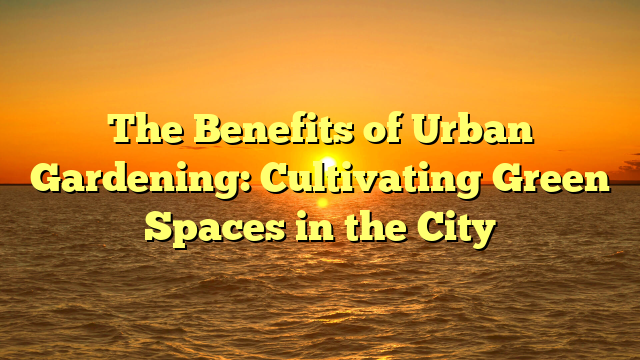In today’s fast-paced urban environments, where concrete and steel dominate the landscape, urban gardening has emerged as a powerful antidote to the stresses of city living. Whether it’s a small balcony herb garden, a rooftop vegetable patch, or a community plot in a vacant lot, growing plants in urban settings offers an array of benefits that extend well beyond a fresh harvest. This article explores how urban gardening improves mental and physical well-being, strengthens community bonds, and contributes to a healthier environment.
1. Enhancing Mental Health and Well-Being
One of the most immediate and profound effects of urban gardening is its impact on mental health. Spending time nurturing plants has been shown to:
- Reduce Stress and Anxiety: Tending to a garden birtoto provides a meditative, hands-on activity that encourages mindfulness and helps to quiet racing thoughts. The act of planting, watering, and pruning plants can lower cortisol levels, bringing about a sense of calm.
- Boost Mood and Self-Esteem: Watching seeds sprout and blooms unfurl fosters a sense of achievement and purpose. Harvesting one’s own vegetables or flowers offers tangible proof of growth and success, which can be particularly empowering in an urban setting where access to natural progressions of time and seasons is limited.
- Combat Urban Isolation: Community gardens, in particular, create shared spaces where neighbors collaborate, exchange tips, and celebrate joint successes. These social interactions combat the loneliness and anonymity that can plague city dwellers.
2. Promoting Physical Health
Urban gardening isn’t just good for the mind; it’s also a subtle yet effective form of exercise:
- Regular Physical Activity: Digging soil, lifting pots, and bending to weed or harvest engage major muscle groups and promote flexibility. Even short gardening sessions can burn calories comparable to a moderate workout.
- Access to Fresh, Nutritious Produce: City gardeners gain direct access to pesticide-free vegetables and herbs. This encourages healthier eating habits and can help mitigate “food deserts”—urban areas with limited access to affordable, nutritious food.
- Sunlight and Vitamin D: Working outdoors, particularly during morning hours, boosts exposure to sunlight and helps maintain healthy vitamin D levels, which are crucial for bone health and immune function.
3. Environmental Benefits
Introducing green spaces into urban areas yields significant ecological advantages:
- Improved Air Quality: Plants absorb carbon dioxide and release oxygen, and many common garden varieties also filter pollutants. On a neighborhood scale, a cluster of well-tended gardens can measurably improve air quality.
- Urban Heat Island Mitigation: Green roofs and vertical gardens help to cool buildings naturally, reducing the need for air conditioning and lowering energy consumption. This effect contributes to mitigating the “urban heat island” phenomenon, where city centers become significantly warmer than surrounding rural areas.
- Stormwater Management: Gardens absorb rainwater, reducing runoff and easing the burden on municipal drainage systems. This natural permeability helps prevent floods and filters pollutants before they reach waterways.
4. Strengthening Communities and Local Economies
Beyond individual benefits, urban gardening can be a catalyst for community development:
- Educational Opportunities: Community gardens often serve as outdoor classrooms, teaching children and adults alike about biology, ecology, and sustainable practices. These hands-on lessons foster environmental stewardship in the next generation.
- Economic Uplift: Local farmers’ markets supplied by urban growers stimulate neighborhood economies. Selling surplus produce can provide supplementary income for gardeners, while affordable harvests help low-income families stretch their food budgets.
- Revitalization of Neglected Spaces: Transforming abandoned lots into thriving green hubs rejuvenates neighborhoods, deters vandalism, and enhances property values.
Conclusion
Urban gardening represents more than a hobby; it’s a multifaceted solution to many challenges posed by modern city life. By cultivating green spaces—whether in a cozy balcony planter or a bustling community plot—residents can improve their mental and physical health, foster stronger social ties, and contribute to a more sustainable urban ecosystem. As cities continue to grow, embracing and expanding urban gardening initiatives will be essential to nurturing resilient, vibrant communities.
